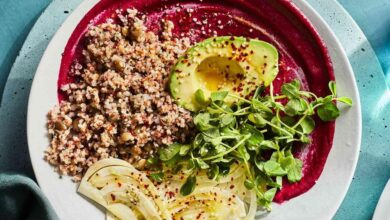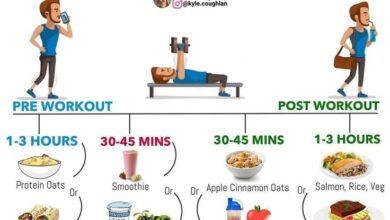
Surefire Weight Loss Habits to Keep for Life
Surefire weight loss habits to keep for life are about more than just a quick fix; they’re about building a sustainable lifestyle that supports long-term health and well-being. Forget the fad diets and restrictive routines that leave you feeling deprived and frustrated.
Instead, let’s explore a holistic approach that focuses on nourishing your body, moving your mind, and creating habits that stick.
This journey isn’t about deprivation or unrealistic goals. It’s about understanding your body’s needs, setting achievable targets, and embracing changes that enhance your overall health. We’ll delve into practical strategies for creating a balanced diet, incorporating regular physical activity, and managing stress effectively – all essential components of sustainable weight loss.
Building a Foundation of Healthy Habits
Sustainable weight loss isn’t just about quick fixes or temporary diets; it’s about creating a lifestyle that supports your health and well-being. This means building a foundation of healthy habits that you can maintain over the long term. This section will delve into crucial elements for long-term success, focusing on nutrition, physical activity, sleep, stress management, and hydration.
Building healthy habits is key to sustainable weight loss, and one of the most crucial is learning to eat in moderation. It’s not about deprivation, but rather finding a balance that works for you. This means being mindful of your portions, choosing nutrient-rich foods, and understanding your hunger cues.
Check out these strategies for eating in moderation to help you develop a sustainable approach to eating that will support your weight loss goals and overall well-being.
Designing a Nutrient-Dense Meal Plan
A balanced diet is essential for weight management and overall health. This means consuming nutrient-dense foods that provide essential vitamins, minerals, and fiber while keeping calories in check. Here’s a sample meal plan that prioritizes nutrient-rich foods:
Breakfast
- Oatmeal with berries and nuts: Oatmeal is a good source of fiber, which helps you feel full and satisfied. Berries are packed with antioxidants, and nuts provide healthy fats and protein.
- Greek yogurt with fruit and granola: Greek yogurt is a great source of protein and calcium. Add some fresh fruit for sweetness and granola for added fiber and crunch.
- Eggs with whole-wheat toast and avocado: Eggs are a good source of protein and healthy fats. Whole-wheat toast provides fiber, and avocado adds healthy fats and fiber.
Lunch
- Salad with grilled chicken or fish: Salads are a great way to get your veggies and protein. Grilled chicken or fish is a lean protein source.
- Soup and a whole-wheat sandwich: Choose a soup that is low in sodium and high in vegetables. Pair it with a whole-wheat sandwich for added fiber.
- Leftovers from dinner: This is a great way to save time and money. Make sure to choose healthy leftovers that are low in calories and high in nutrients.
Dinner
- Baked salmon with roasted vegetables: Salmon is a great source of omega-3 fatty acids, which are good for your heart. Roasted vegetables are a good source of vitamins, minerals, and fiber.
- Chicken stir-fry with brown rice: Chicken stir-fry is a quick and easy meal that is packed with nutrients. Brown rice is a good source of fiber.
- Lentil soup with whole-wheat bread: Lentil soup is a hearty and healthy meal that is high in protein and fiber. Whole-wheat bread provides added fiber.
Snacks
- Fruits and vegetables: Apples, bananas, carrots, celery, and bell peppers are all good choices.
- Nuts and seeds: Almonds, walnuts, pumpkin seeds, and sunflower seeds are good sources of protein and healthy fats.
- Plain yogurt: Greek yogurt is a great source of protein and calcium.
Incorporating Regular Physical Activity
Regular physical activity is crucial for weight management and overall health. Aim for at least 150 minutes of moderate-intensity aerobic activity or 75 minutes of vigorous-intensity aerobic activity per week. Here are some tips for incorporating physical activity into a busy lifestyle:
- Take the stairs instead of the elevator.
- Walk or bike to work or errands.
- Join a gym or fitness class.
- Find an activity you enjoy and make it a regular part of your routine.
Sleep, Stress Management, and Hydration, Surefire weight loss habits to keep for life
These factors are often overlooked but play a vital role in weight management.
Sleep
Getting enough sleep is essential for regulating hormones that control appetite and metabolism. Aim for 7-9 hours of quality sleep each night.
Stress Management
Stress can lead to overeating and weight gain. Find healthy ways to manage stress, such as exercise, yoga, meditation, or spending time in nature.
Hydration
Drinking enough water is crucial for many bodily functions, including metabolism and appetite regulation. Aim for 8 glasses of water per day.
Making Sustainable Dietary Changes: Surefire Weight Loss Habits To Keep For Life
Making sustainable dietary changes is crucial for long-term weight loss success. Instead of resorting to restrictive fad diets, focus on building a balanced and enjoyable eating pattern that aligns with your lifestyle and preferences. This approach fosters a healthier relationship with food and promotes lasting weight management.
Comparing Different Diet Types
Understanding the key features of different diet types can help you choose one that suits your needs and preferences. Here’s a comparison of some popular diets:
| Diet | Key Features | Pros | Cons |
|---|---|---|---|
| Mediterranean Diet | Emphasis on fruits, vegetables, whole grains, olive oil, fish, and moderate consumption of red meat and dairy. | Rich in antioxidants, heart-healthy fats, and fiber. May reduce risk of chronic diseases. | May require significant lifestyle changes, including access to fresh produce and seafood. |
| DASH Diet | Focuses on lowering blood pressure through reduced sodium intake and increased potassium, magnesium, and calcium. | Proven effective in managing hypertension. May also aid in weight loss. | May be restrictive in terms of sodium intake, which can be challenging for some individuals. |
| Flexitarian Diet | Semi-vegetarian approach with occasional meat consumption. Emphasizes plant-based foods. | Offers flexibility and can be easier to adapt to. May improve overall health. | May not be suitable for individuals with specific dietary needs or preferences. |
Promoting Satiety with Healthy Snacks and Meal Replacements
Choosing snacks and meal replacements that promote satiety is essential for managing hunger and preventing overeating. Here are some examples:
- High-protein snacks:Greek yogurt with berries, hard-boiled eggs, cottage cheese with vegetables.
- Fiber-rich options:Fruits and vegetables, whole-grain crackers, popcorn.
- Healthy fats:Nuts and seeds, avocado, nut butter.
Strategies for Managing Cravings and Avoiding Unhealthy Indulgences
Cravings are a natural part of human biology. Instead of trying to suppress them completely, focus on managing them effectively.
Surefire weight loss habits are about consistency and sustainable choices. While many swear by supplements, the experts debate should you supplement experts debate should you supplement for weight loss. Ultimately, it’s about finding what works best for you, whether it’s focusing on whole foods, staying active, or incorporating mindful eating practices.
- Identify triggers:Pay attention to what situations or emotions tend to trigger your cravings. This awareness can help you develop coping mechanisms.
- Delay gratification:When a craving hits, wait for 15-20 minutes before indulging. Often, the urge will subside.
- Healthy alternatives:Keep healthy snacks on hand to satisfy cravings in a nutritious way. For example, instead of reaching for a bag of chips, opt for a handful of almonds.
- Mindful eating:Pay attention to your food choices and savor each bite. This can help you feel more satisfied with smaller portions.
- Seek support:Talk to a trusted friend, family member, or therapist about your struggles with cravings. Their support can be invaluable.
Staying Active and Engaged

Movement is an integral part of a healthy lifestyle, contributing significantly to weight management and overall well-being. Engaging in regular physical activity not only helps burn calories but also strengthens muscles, improves cardiovascular health, and boosts mood.
Types of Exercise and Their Benefits
Different types of exercise offer unique benefits, making it essential to incorporate a variety of activities into your routine.
- Cardiovascular Exercise: Cardio, or aerobic exercise, elevates your heart rate and improves cardiovascular health. Examples include running, swimming, cycling, and dancing. Regular cardio can reduce the risk of heart disease, stroke, and type 2 diabetes, while also improving lung capacity and endurance.
Building sustainable weight loss habits isn’t about drastic changes, it’s about finding small, manageable practices that fit into your lifestyle. Remember that healthy habits can be rediscovered, even if they’ve been neglected for a while. Check out this article on ways to rediscover lost healthy habits for inspiration.
Once you’ve re-established those healthy routines, you’ll be surprised how effortlessly they become a part of your daily life, helping you reach your weight loss goals and maintain them long-term.
- Strength Training: This type of exercise focuses on building and maintaining muscle mass. Weightlifting, resistance bands, and bodyweight exercises are all forms of strength training. Building muscle increases metabolism, improves bone density, and enhances overall strength and mobility.
- High-Intensity Interval Training (HIIT): HIIT involves short bursts of intense exercise followed by brief recovery periods. This type of training is highly effective for burning calories and improving cardiovascular fitness in a shorter amount of time.
Fun and Engaging Activities
Finding enjoyable ways to stay active can make exercise a more sustainable habit. Here are some fun and engaging activities that encourage movement:
- Dance Classes: From Zumba to hip-hop, dance classes are a great way to burn calories and have fun while improving coordination and rhythm.
- Team Sports: Joining a recreational sports league or playing with friends is a social way to stay active and enjoy competition.
- Hiking and Biking: Exploring nature through hiking or biking provides a great workout while enjoying scenic views and fresh air.
- Active Video Games: Games like Dance Dance Revolution or Wii Fit can be a fun and engaging way to get moving, especially for those who prefer indoor activities.
Finding an Exercise Routine
The key to sticking with an exercise routine is finding activities that you enjoy and that fit your individual preferences and abilities.
- Start Gradually: Begin with short sessions and gradually increase the duration and intensity as you build endurance.
- Listen to Your Body: Rest when you need to, and don’t push yourself beyond your limits.
- Find a Buddy: Having a workout partner can provide motivation and accountability.
- Mix It Up: Vary your activities to avoid boredom and target different muscle groups.
Monitoring Progress and Staying Motivated
Keeping track of your progress and staying motivated are essential for achieving sustainable weight loss. It helps you stay accountable, identify areas for improvement, and celebrate your achievements along the way.
Tracking Food Intake and Exercise Levels
Tracking your food intake and exercise levels provides valuable insights into your daily habits and helps you identify areas for improvement.
- Food Journals:A food journal can be a simple notebook or a dedicated app. Record everything you eat and drink, including portion sizes. This allows you to analyze your calorie intake and identify patterns in your eating habits.
- Fitness Trackers:Wearable fitness trackers or smartphone apps can monitor your steps, distance, calories burned, and sleep patterns. This data provides a comprehensive view of your physical activity levels and helps you set realistic goals.
- Online Tools:Several websites and apps offer calorie-tracking and meal planning features. These tools can help you estimate your daily calorie needs, create meal plans, and track your progress over time.
Designing a Motivational Plan
A well-designed motivational plan can keep you focused and inspired on your weight loss journey.
- Set Realistic Goals:Avoid setting overly ambitious goals that are difficult to achieve. Instead, focus on making small, gradual changes that are sustainable over time. For example, aim to lose 1-2 pounds per week.
- Break Down Goals into Smaller Milestones:Divide your overall weight loss goal into smaller, achievable milestones. This creates a sense of accomplishment and keeps you motivated as you progress.
- Reward Yourself:Celebrate your milestones with non-food rewards, such as buying yourself a new workout outfit, enjoying a relaxing massage, or spending time with loved ones.
Celebrating Successes and Learning from Setbacks
Acknowledging your successes and learning from setbacks are crucial for maintaining motivation.
- Celebrate Your Wins:Take time to appreciate your achievements, no matter how small. This could be reaching a weight loss milestone, fitting into a smaller size, or simply sticking to your healthy eating plan for a week.
- Analyze Setbacks:When you experience setbacks, don’t get discouraged. Instead, analyze what went wrong and identify strategies to avoid similar situations in the future. Perhaps you didn’t plan your meals ahead of time, or you weren’t prepared for a social event. Learning from these experiences will help you stay on track.
Concluding Remarks
Remember, sustainable weight loss is a marathon, not a sprint. It’s about making gradual, positive changes that you can maintain over time. By adopting these surefire habits, you’re not just losing weight; you’re investing in a healthier, happier you.
Embrace the journey, celebrate your successes, and never hesitate to seek support along the way. You’ve got this!





